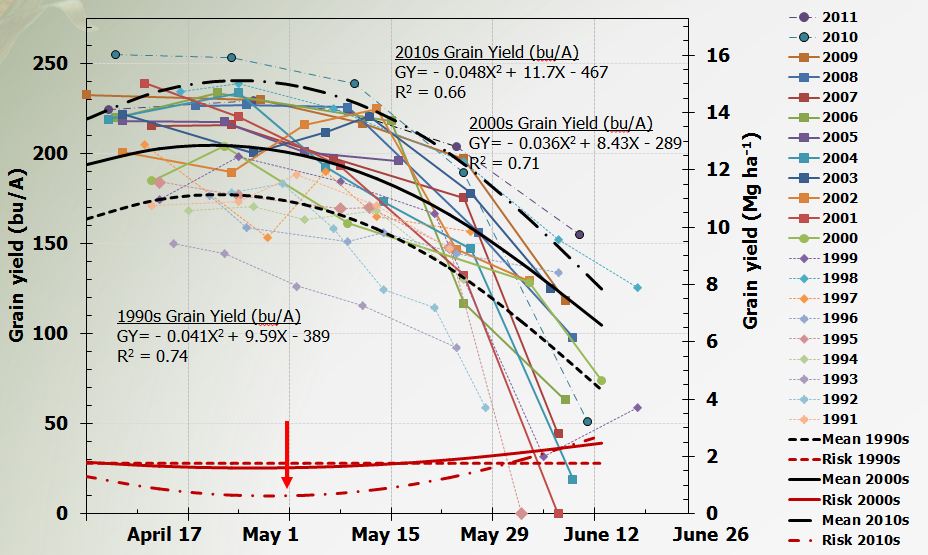Patience When Thinking about Planting Corn this Year
Joe Lauer, Corn Agronomist
The weather this year has many farmers and agronomists wondering, “What if?” What if I had planted in March? What if I plant before crop insurance kicks in on April 11? What if I wait until “normal” planting dates?
Every year we recommend, when planting prior to April 20, that field conditions must dictate when we start planting. This year field conditions were right in March. The historical optimum planting date for corn is May 1 in southern Wisconsin and May 7 in northern. Every field and farm likely has slightly different optimum planting dates. We also know that delayed planting often results in lower yields as well as the “double-whammy” of higher grain moisture, which can be as expensive as lower yields.
Since 1991, we have conducted a planting date trial every year at the UW Agricultural Research Center in Arlington. We target May 1 as the optimum planting date and we plant as early as field conditions allow before that date and every two weeks after (May 15, June 1, and June 15). Often when we plant corn on the first date, there is still snow on the sides of the fields in ditches.
Figure 1 shows the grain yield response to planting date and the risk associated with each planting date of a full-season hybrid at Arlington. The heavy lines are the averages that have occurred during the 1990s, 2000s and 2010s (so far). Both 2010 and 2011 were exceptionally high yielding years. In each decade we have seen an increase in grain yield. The planting date response pattern is similar between decades. The optimum planting date has been around May 1. All April planting dates were greater than 95% of the optimum date. It isn’t until mid-May that yields fall below 95% of the optimum planting date. During 1995 and 2001 no grain yield was produced on the last planting dates in June.
Figure 1. The corn grain yield response of planting date at Arlington, WI. Grain yield risk is the standard deviation (+ bu/A) associated with each planting date. The arrow is the historical optimum planting date.
During the 1990s, planting date risk (or the standard deviation) was the same (+ 28 bu/A) regardless of planting date. During the 2000s, risk was curvilinear with higher risk during later planting dates. So far in the 2010s, planting date risk is also curvilinear with the least risk occurring on the historical optimum planting date of May 1.
The earliest we have ever planted corn at Arlington was during 2010 in a trial designed to test the effect of seed treatments on early season stress (see report here). In that trial we planted March 31, April 14, and May 18. This was not a planting date trial since treatments were planted in side-by-side blocks by planting date, but it gives us some sense of what might happen with March planting. The average yield for each respective planting date among all of the treatments was 227, 238 and 227 bu/A.
Insurance coverage needs to be considered when thinking about when to start planting corn. For the latest on crop insurance see Mitchell (2012).
When planting early we are most concerned about the last spring killing frost. This has to occur before the growing point moves above ground after the V5 developmental growth stage (Abendroth et al., 2011). We don’t have to go too far back to remember the devastating effects of a late-killing frost that occurred on June 20, 1992 when most of the Wisconsin crop was between V6 and V8. Unfortunately, the last killing frost is difficult to predict and manage for.
Of course replanting can occur for numerous reasons besides late-killing frost. The biggest concern in a replant situation is hybrid choice of the replanted hybrid. Can I replace the hybrid I chose? If I have to settle for another hybrid, what is the yield penalty of the alternative hybrid? What is the yield penalty of the later planting date? What about the “double whammy” of lower yield AND higher grain moisture?
Patience is key here. You only get one chance to do things right in a field. Be ready to go. Get as much of your spring work done as you can. Waiting until the crop insurance dates kick in is not unreasonable.
Literature Cited
Abendroth, L.J., R.W. Elmore, M.J. Boyer, and S.K. Marlay. 2011. Corn growth and development. PMR1009. Iowa State University.
Mitchell, P. 2012. Crop Insurance Implications of Planting Crops Early. Wisconsin Crop Manager, March 21, 2012 https://ipcm.webhosting.cals.wisc.edu/blog/2012/03/960/.
